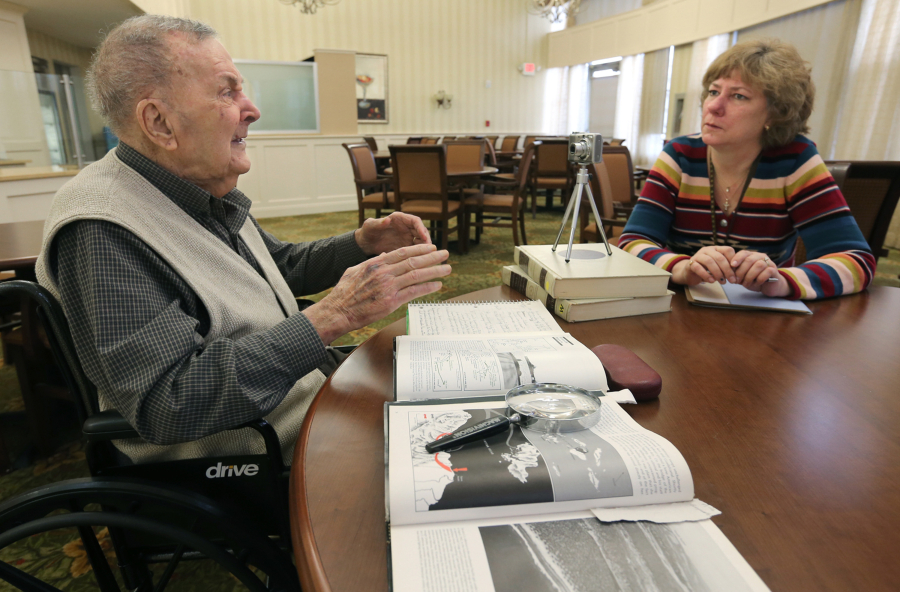AKRON, Ohio — Time is running out.
The youngest World War II veterans are in their 90s now, and many of them are well past the ability to articulate their experiences.
That makes these moments all the more important for Suzanne Nichols as she sets up her video camera on a tripod, focuses the lens on Clyde Dye, then prompts him: “So you were telling me about that oil tanker.”
Nichols records military stories and collects documents and photos for the Library of Congress’ Veterans History Project.
The Akron woman joined the national effort two years ago while looking for a volunteer opportunity at Summa Health, whose hospice program is in a unique position to spot personal histories in need of some quick preservation.
“I come from a big military family,” Nichols said, explaining her passion. “My husband was Navy, my brother was Navy, my uncle was Navy. I think it’s very important for people to see, not the historical truth, the big picture, the stuff you see in books, but the small stories.”
This month, Dye became Nichols’ seventh subject. The 93-year-old former Navy man, who lives at Rockynol in Akron with his 89-year-old wife, Pat, was recommended to her because of his sharp memory and gift of gab.
As a guide, the Library of Congress field kit suggests looking for elderly vets who have the energy and clarity to speak about their experiences for at least 30 minutes.
No problem for Clyde Dye, whose crisp memory of moments that ranged from the mundane to the dramatic filled more than two hours of video.
Nichols loves to coax out the colorful everyday stories of ship life, and Dye didn’t disappoint as he hit the highlights of his time as a radarman aboard the destroyer USS McConnell.
“We were coming off the ship one night. I was with Dickie Heffner. Doesn’t that sound like Brooklyn?” Dye laughed. “Anyway, we looked over in the officers’ quarters and a steward had left a smoking steak in the middle of the meeting room. And we both thought the same thing at the same time. He said, ‘Should we get it, Dye?’ And I said, ‘Get it, Dickie.’ ”
Without missing a beat, Dye dove right into another story, this one a suspenseful tale of a time when his ship was in line with dozens of other vessels waiting to be refueled by an oil tanker in the Pacific.
He had control of the ship’s rudders when the captain gave him a “hard right rudder” order that, if fulfilled, would have been a catastrophe.
“There’s no way I could turn to hard right rudder without possibly sinking two or three ships,” Dye said.
He made the heart-pounding decision to ignore the captain, knowing there would be serious consequences for disobeying an order. Instead, the captain thanked him.
Dye came prepared for his interview session: A couple of World War II history books with maps to supplement his stories, a folder filled with military papers and a magnifying glass to help him see it all.
Nichols came prepared, too. She always meets with her veterans briefly to get their military backgrounds so she can research the campaigns of their units. Then when she comes back for the interview, she better understands the stories they reveal to her.
She carries a scanner for making copies of documents, edits the video she makes, and submits her final presentation to the veterans and their families before submitting them to the Library of Congress.
Efforts to record World War II memoirs are not new. Everyone from professionally trained historians with the National Park Service to school children making audio recordings for their local library have been working in concert for decades to preserve that remarkable era.
But 70 years after being discharged from the Navy, this month marked the first time anyone asked Dye to dig into the past for the record.
“It’s a good thing. I’m glad somebody cares. If she’s satisfied,” Dye said, nodding toward Nichols with a wry smile, “then I’m satisfied.”



